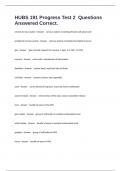HUBS 191 Progress Test 2 Questions
Answered Correct.
central nervous system - Answer nervous system consisting of brain and spinal cord
peripheral nervous system - Answer nervous system consisting of peripheral nerves
glia - Answer 'glue' provide support for neurons, 5 type, 4 in CNS, 1 in PNS
neurons - Answer nerve cells, transmission of information
dendrites - Answer recieve input, send info into cell body
cell body - Answer contains nucleus and organelles
axon - Answer carries electrical impulses, may/may not be myelinated
axon terminals - Answer end terminus of the axon, neuro transmitter release
tract - Answer bundle of axons in the CNS
grey matter - Answer group of cell bodies in cerebral cortex/spinal cord
white matter - Answer bundle of axons in cerebral cortex/spinal cord
ganglion - Answer group of cell bodies in PNS
nerve - Answer bundle of axons in PNS
,input zone - Answer dendrites and cell body, receives chemical signals from other neurons
summation zone - Answer axon hillock, decides to transmit signal or not
conduction zone - Answer axon may be quite long, carry electrical signals between brain areas to and
from spinal cord or to and from peripheral sensory receptors
output zone - Answer axon terminals, contact input of other neurons, release of neuro transmitter
multipolar - Answer multiple processes emanate from the cell body, the 'typical' neuron
bipolar - Answer 2 processes emanate from the cell body (axon and long bridge to dendrites
unipolar - Answer 1 process emanates from cell body (hangs on side of axon)
anaxonic - Answer no distinct axon, all processes look alike
astrocytes - Answer supply nutrients to neuron, ensheath blood capillaries, transmit information, CNS
microglia - Answer immune cells of the CNS, engulf micro organisms / debris
ependymal cells - Answer line fluid filled spaces of brain and spinal cord, have cillia to circulate CSF,
CNS
oligodentrocytes - Answer support nerve fibres, ensheath them with myelin, CNS
schwann cells - Answer support peripheral nerve fibres, ensheath them with myelin, similar to
oligodendrocytes, PNS
, myelin sheath - Answer lipid wrapped around axon, increases conduction velocity, multiple schwann
cells in a row form the myelin sheath, gaps between myelin called nodes of ranivier
Synapse/Synpatic Cleft - Answer neuro transmitter release from one axon terminals where electrical
turns to chemical
afferent - Answer information going into the brain
efferent - Answer information out of brain
flow of information - Answer info comes through receptors, afferent nerves, into CNS,
integration/coordination, motor efferent (somatic or autonomic)
somatic - Answer the stuff we are aware of and have control over
somatic afferent - Answer sensory information of what we are aware of
somatic efferent - Answer voluntary muscle control, 2 neurons between brain and effector, upper and
lower motor neuron
upper motor neuron - Answer cell body in brain, axon in spinal cord
lower motor neuron - Answer cell body in spinal cord, axon in spinal nerve
neuro-muscular junction - Answer Where neuron releases neurotransmitters (ACh) that depolarize
muscle fiber cells -> contraction
autonomic - Answer involuntary control, 3 neurons between brain and effector, 2 divisions,
sympathetic and parasympathetic
autonomic neuron 1 - Answer cell body in brain, axon in brain or spinal cord (CNS)




